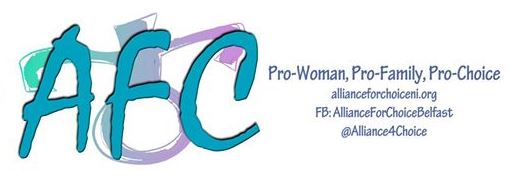Alliance for Choice Press Release, 10th October 2013.
On Wednesday 9th October, the Northern Irish public learned the story of a brave woman, ‘Sarah’ who was refused an abortion at a Northern Ireland hospital despite the reality of an unviable pregnancy due to severe foetal abnormality.
Primarily, this case highlights the need for the current draft Guidelines on our legislation to be effectively published, taking into account the consultation submissions by groups including ourselves.
Alliance for Choice is calling for :
● Immediate re-drafting of the guidelines and their publication
● This matter to fall under the jurisdiction of the Health Department, rather than the Criminal Justice department. This is a medical, not a criminal matter
● A referendum so that the public can decide on a change in the Law
Alliance for Choice is extremely concerned that the Assembly in Stormont is not effectively representing the views of the Northern Ireland public. Repeated surveys have shown the majority of the population are supportive of a change in the law towards the U.K. 1967 Act and yet the politicians’ continued inaction reflects their disregard for Northern Irish opinion.
Information:
In 2009, the United Nations Committee on Economic, Social and Cultural Rights, recommended that the NI Assembly “amend the abortion law to bring it in line with the 1967 Abortion Act with a view to preventing clandestine and unsafe abortions in cases of rape, incest or foetal abnormality.”
In July 2013 the CEDAW Committee again reminded the government that it had made recommendations with regard to abortion in 1999 and in 2008 and for the UK and Northern Ireland to ignore these is a flagrant disregard of international standards.
The Guidelines with respect to foetal abnormality and our recommendations:
The final sentence in para 1.1. of the Guidance “Intervention cannot have as its direct purpose the ending of the life of the unborn child” is not only medically meaningless but is contrary to the law as defined by case law.
Para 2.7 iv. States that “Fetal abnormality is not recognised as grounds for termination of pregnancy in Northern Ireland.” However, there is widespread ante-natal screening for foetal abnormality. When there is an abnormality, this is usually a tragedy for the couples involved in what was a wanted pregnancy. While it used to be possible for families to be provided with a termination in local facility.


